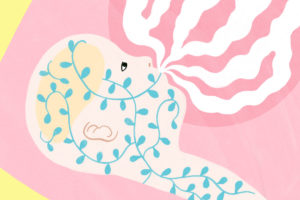Is human breast milk so important or is it a myth?
It appears that human breast milk is a VERY complex natural probiotic and prebiotic for infants in addition to the list of other benefits.
What is so different about human breastmilk vs commonly used cow’s milk present in infant formulas?
Human breast milk is vital in protecting babies from neonatal sepsis, gut pathogens, for the promotion of infant growth and their development. Why is that? Unlike cow’s milk based formula human milk has bioactive components such as microbes, unique oligosaccharides, immune substances and others.
Source of good bacteria
The most recent study produced by the APC Microbiome Institute (where I actually did my PhD) and published in Nature demonstrates that the microbiota of human milk is more diverse than originally thought! Eighty one percent of all identified bacterial genera in human breast milk is represented by only twelve – Pseudomonas, Staphylococcus, Streptococcus, Elizabethkingia, Variovorax, Bifidobacterium, Flavobacterium, Lactobacillus, Stenotrophomonas, Brevundimonas, Chryseobacterium and Enterobacter. They are called the core microbiota of human milk.
Total, 207 different genera have been identified that include many more different bacterial species.
Most of the bacteria present in human milk, as mentioned above, belong s to Staphylococcus, Streptococcus, and Lactobacillus and Bifidobacterium spp. (that are probably familiar to you as most of them belong to well-known probiotics). Infants consume approximately 800 mL/day of milk a day and ingest with it between 1 × 10^5 and 1 × 10^7 bacteria daily which makes it the main source of bacteria that populates the gut of breastfed infant. Those infants that are formula fed are not getting any of these bacteria which explains why their microbiota is so different.
Breast milk improves immunity
Immunoglobulins present in human milk are protecting infant immunologically while its own immune system develops. Antibodies present in human breast milk protect infants from invasive pathogens.
Human milk oligosaccharides
Breast milk is a “superfood that is actually worthy of the label.” Human milk oligosaccharides (HMO) are the third largest component of human milk after fats and lactose and they act as prebiotics by encouraging the growth of good bacteria in their guts such as Bifidobacterium infantis (also a well know probiotic) and others. There are over 200 different human milk oligosaccharides known to be present in human milk. Human milk oligosaccharides, that are found only in human breast milk, are feeding a specific microbe Bifidobacterium infantis, that is also coming only from the breast milk. “By keeping this bacterium well fed, mothers can raise brainier babies.” Breast milk is the best medication for premature babies.
How you can help develop healthy baby microbiota
There are instances, however, when mother’s milk is not available and formula is the way to go. To make sure babies gut microbiota is developing healthy way parents of exclusively formula fed baby should consider introducing infant probiotics. Those moms that were not able to deliver babies naturally but are able to breastfeed should consider consuming probiotics, a lot of fermented foods (like sauerkraut, kimchi, yogurt and tempe) and fermented drinks (kombucha, water and milk kefir) as well lots of fruit and in particular vegetables rich in fiber. If you feel that you are not consuming enough vegetables then supplement your diet with prebiotics that will feed your good bacteria and insure the transfer into mother’s breastmilk.
Do you have too much breast milk? Donate it to a mom who needs it or to the research at UC Davis. Follow this link to read more here.



Trackbacks/Pingbacks